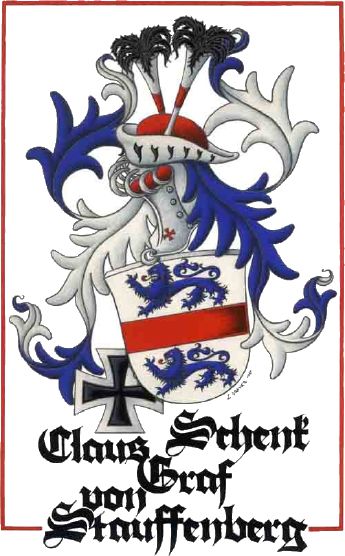Remembering the July 20 Plot
 Sixty three years ago today the Catholic aristocrat Col. Claus von Stauffenberg placed a bomb under Hitler's table at his isolated headquarters in Prussia. Though
Sixty three years ago today the Catholic aristocrat Col. Claus von Stauffenberg placed a bomb under Hitler's table at his isolated headquarters in Prussia. ThoughStauffenberg’s bomb did not succeeded in killing the Führer, it left his right arm partly paralyzed, burned his right leg and damaged both eardrums. “He would never fully recover from the physical and mental shocks,” one author wrote. To the armchair historian of World War II, Stauffenberg's failed assassination attempt is common knowledge.
Far less well known is that a large conspiracy stood behind Stauffenberg; their planned coup began to unfold in spite of the assassination attempt's failure, until they were brutally put down by the SS. That the Third Reich was in turmoil was not widely known to the Allies or the German people.
 Stauffenberg’s bomb was not an isolated incident. In the hours after its explosion, orders were being issued from the conspirators’ Berlin headquarters. Paris, Vienna, Prague, Belgrade, and other parts of Germany and of German-occupied countries were in ferment. When Hitler received word that order had not been restored to Berlin he gave the SS authority to shoot on sight, demanding the situation be brought under control; thousands would be rounded up, tortured and killed to that end.
Stauffenberg’s bomb was not an isolated incident. In the hours after its explosion, orders were being issued from the conspirators’ Berlin headquarters. Paris, Vienna, Prague, Belgrade, and other parts of Germany and of German-occupied countries were in ferment. When Hitler received word that order had not been restored to Berlin he gave the SS authority to shoot on sight, demanding the situation be brought under control; thousands would be rounded up, tortured and killed to that end.Meanwhile, each Military District commander throughout Germany was told to open a sealed envelope in his safe labeled Walküre (Valkyrie), the special orders for operating against internal disturbances; these orders, carefully written by the conspirators over the preceding months, established martial law and reveled the location of the Gestapo’s secret headquarters and the likely hiding places of top Nazis. In addition, reports of Hitler’s death and an alleged SS attack upon the Wehrmacht were sent out. Strategic points were ordered occupied and SS leaders arrested.
However, the reserve troops that were suppose to secure Berlin were late in coming; by 7:00pm, when the conspirators decided they needed to seize the radio station so Gen. Beck could make a statement, they still did not have enough reliable troops to do so. When Major Remer, commander of a unit of the crack Grossdeutschland division, was ordered to occupy the Reich Chancellery and arrest a number of SS officers, he questioned the source of the orders and, after a series of telephone calls, ended up speaking with Hitler himself, who gave him authority to “shoot as many people as he liked” and ordered him to clean out the Replacement Army. Remer immediately began stopping military units coming into Berlin, ordering back from whence they came.
The popular Col. Gen. Heinz Guderian, who had been a tacit supporter of the conspiracy, also began ordering troops out of the city, when he saw that the putsch had failed. In one case a tank battalion returned to its barracks in the town of Crampnitz, only to find that the SS had gotten there first, burning the barracks and massacring the soldiers still there. The SS had fewer inhibitions than the army.
By 9:00pm the Nazis had regained control of Berlin. Gen. Beck was forced to take his own life. Col. Stauffenberg and several other leading conspirators were summarily executed. By 11:00pm the staff at Stauffenberg’s office were arrested, their lives spared by the Gestapo in order to interrogate them and find out the names of other conspirators.
Allen W. Dulles, the first English-language historian of the July 20 plot wrote this:
There was an anti-Nazi underground working in Germany, despite the general impression to the contrary. It developed out of heterogeneous groups that finally achieved a working unity and reached into the vitals of the army and the government services. Professional men, church and labor leaders, and high commanding officers on various fronts participated. Even Field Marshals [Erwin] Rommel and [Günther] von Kluge finally had a share, but this was late in the day, when they saw that military victory had eluded them. But there were others of a very different moral fiber, both civilian and military, who were not opportunists and who had fought Hitlerism for many years.... It is easy to criticize the German underground for its delays, disunities, vacillations, and ultimate failure. But in a police state such as Hitler and Himmler organized it is not likely that men will do much better than a Beck, a Goerdeler, a Moltke, a Leuschner or a Stauffenberg.
Labels: history, politics, Stauffenberg


3 Comments:
If you keep up your antennae, you'll run into these guys surprisingly often. Just today I was studying for a geostrategy exam and noticed that the Gen. Karl Haushofer (1869-1946), a major thinker in the field, had a son who participated in the plot. The conspirators were not isolated individuals but in many ways the flower of a generation.
By Aaron Linderman, at 11:55 AM, July 28, 2007
Aaron Linderman, at 11:55 AM, July 28, 2007
To back Aaron up.. The founder of quantum physics, Max Planck, lost his son, Erwin, in 1945...Erwin was also executed for being a part of the plot.
By Anonymous, at 12:36 PM, October 14, 2007
Anonymous, at 12:36 PM, October 14, 2007
I really like when people are expressing their opinion and thought. So I like the way you are writing
By Anonymous, at 12:29 AM, February 20, 2010
Anonymous, at 12:29 AM, February 20, 2010
Post a Comment
<< Home